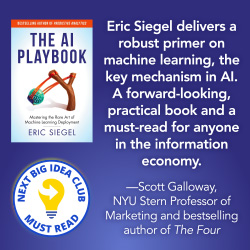Eric Siegel had already been working in the machine learning world for more than 30 years by the time the rest of the world caught up with him. Siegel’s been a machine learning (ML) consultant to Fortune 500 companies, an author, and a former former Columbia University professor, and to him the last year or so of AI hype has gotten way out of hand.
Though the world has come to accept AI as our grand technological future, it’s often hard to distinguish from classic ML, which has, in fact, been around for decades. ML predicts which ads we see online, it keeps inboxes free of spam, and it powers facial recognition. (Siegel’s popular Machine Learning Week conference has been running since 2009.) AI, on the other hand, has lately come to refer to generative AI systems like ChatGPT, some of which are capable of performing humanlike tasks.
But Siegel thinks the term “artificial intelligence” oversells what today’s systems can do. More importantly, in his new book The AI Playbook: Mastering the Rare Art of Machine Learning Deployment, which is due out in February, Siegel makes a more radical argument: that the hype around AI distracts from its now proven ability to carry out powerful, but unsexy tasks. For example, UPS was able to cut 185 million delivery miles and save $350 million annually, in large part by building an ML system to predict package destinations for hundreds of millions of addresses. Not exactly society-shattering, but certainly impactful.
The AI Playbook is an antidote to overheated rhetoric of all-powerful AI. Whether you call it AI or ML—and yes, the terms get awfully blurry—the book helpfully lays out the key steps to deploying the technology we’re now all obsessed with. Fast Company spoke to Siegel about why so many AI projects fail to get off the ground and how to get execs and engineers on the same page. The conversation has been edited for length and clarity.
As someone who’s worked in the machine learning industry for decades, how has it been for you personally the last year watching the hype around AI since ChatGPT launched?
It’s kind of over the top, right? There’s a part of me that totally understands why the AI brand and concept has been so well adopted—and, indeed, as a child, that’s what got me into all this in the first place. There is a side of me that I try to reserve for private conversations with friends that’s frustrated with the hype and has been for a very long time. That hype just got about 10 or 20 times worse a year ago.
Why do you think the term “artificial intelligence” is so misleading now?
Everyone talks about that conference at Dartmouth in the 1950s, where they set out to sort of decide how they’re going to create AI.[Editor’s note: In 1956, leading scientists and philosophers met at the “Dartmouth Summer Research Project on Artificial Intelligence.” The conference is credited with launching AI as a discipline.] This meeting is almost always reported on and reiterated with reverence.
But, no—I mean, the problem is what they did with the branding and the concept of AI, a problem that still persists to this day. It’s mythology that you can anthropomorphize a machine in a plausible way. Now, I don’t mean that theoretically, that a machine could never be as all-capable as a human. But it’s the idea that you can program a machine to do all the things the human brain or human mind does, which is a much, much, much more unwieldy proposition than people generally take into account.
And they mistake [AI’s] progress and improvements on certain tasks—as impressive as they truly are—with progress towards human-level capability. So the attempt is to abstract the word intelligence away from humanity.
Your book focuses on how companies can use this technology in the real world. Whether you call it ML or AI, how can companies get this tech right?
By focusing on truly valuable operational improvements by way of machine learning. We see that focus on concrete value and realistic uses of today’s technology. In part, the book is an antidote to the AI hype or a solution to it.
So what the book does is to break it down into a six-step process that I call BizML, the end-to-end practice for running a machine learning project. So that not only is the number-crunching sound, but in the end, it actually deploys and generates a true return to the organization.
To continue reading this article, click here.







Pingback: Essential Innovations In Transportation & Logistics For Improved Efficiency - ZOBUZ
I am delighted to have discovered this website at last. It’s incredibly informative and engaging.
Thank you for your post and the effort you’ve put into it! Please continue sharing more content like this.
Ensure safety and reliability with expert brake maintenance services, providing detailed inspections and prompt repairs to keep your truck’s braking system in top condition.
You’re welcome to check out my webpage as well. brake maintenance
For gamers seeking a challenge, Run 3 Unblocked is in the middle of an exciting adventure, offering endless space tunnels to explore.
我们拥有一支由学术专家组成的专业团队,覆盖多种学科领域,无论是基础课程、专业课程还是高难度的实验性课程,我们都能为你提供全面的网课代修 http://www.wangkedaixiu.com/wkdx/ 服务。我们保证按照你的学习进度和要求,代为完成课程中的所有任务,包括日常作业、测试、讨论互动、期中期末考试等。我们的目标是确保你不仅能顺利通过课程,还能在每一项任务中获得满意的成绩。
In this guide, we’ll explore what makes Incredibox Sprunki special, its gameplay, tips for creating your own compositions, and how it differs from previous versions.
For mobile users, tapping the screen initiates key Sprunki actions, such as jumping or interacting with in-game elements. The swiping mechanism is primarily used for directional movement, allowing the character to move left, right, or perform actions like dodging obstacles or collecting items.
Predictive AI Only Works Sprunki Retake If Stakeholders Tune This Dial”: Highlights the importance of human involvement in AI implementation. The Rise Of Large Database Models”: Focuses on a specific trend in AI development.
Eric Siegel offers such an insightful perspective on the divide between AI’s hype and its practical capabilities. His distinction between classic machine learning (ML) and the generative AI wave underscores how far the buzz has drifted from the grounded, problem-solving applications of ML that have been shaping industries for decades. Official Site
One of the most fascinating takeaways is how Siegel critiques the overuse of the term “artificial intelligence.” The tendency to anthropomorphize machines and overstate their capabilities can obscure the genuine, yet often unglamorous, value that ML brings to businesses. His example of UPS using ML to save $350 million annually is a prime illustration of how these “unsexy” systems quietly drive massive impacts without much fanfare.
What stands out in Siegel’s philosophy, as detailed in The AI Playbook, is the focus on making sure ML projects generate real-world value, rather than getting derailed by unrealistic expectations. His six-step BizML approach appears to ground machine learning initiatives in measurable results, bridging the gap between executive visions and technical execution.
It’s a reminder that while AI has the potential to transform the world, it’s crucial to approach it with a realistic Escape Road City and grounded perspective.
Pennsylvania E-ZPass portal makes managing your toll payments and account settings easy and efficient. Whether you’re driving through the Pennsylvania Turnpike or another toll road in the state, having access to your EZ Pass account online through the EZ Pass PA login portal is incredibly convenient.
This insightful analysis of AI’s current state! Your industry expertise enriches the discussion. It’s important to distinguish between “artificial intelligence” hype and genuine capabilities—it’s easy to get caught up in the idea of robots that can ‘think’ like humans. basketball stars You prioritize practical applications and real-world benefits, which I like. BizML seems like a useful platform for organizations wishing to use ML without hype. I appreciate your input!
Retro Bowl Graphics: The 8-bit style is nostalgic and charming, making every touchdown visually satisfying.
Slither io is a very simple game that anyone can quickly pick up and play. This creates a level playing field where skill and strategy are the deciding factors.
An exciting and quick-paced adventure game, Poor Bunny is perilous at every turn. You just have to avoid obstacles, collect carrots, and see how long you can survive.
Did you know that playing Wacky Flip not only helps you relax but also trains your reflexes extremely well? Each jump requires precise calculation of force, angle, and time – sounds simple but is incredibly “brain-twisting”! Try it once and you will want to play forever. Don’t be surprised if you accidentally “get addicted” without realizing it!
The headlines promise a revolution—sentient chatbots, jobless economies, even the end of human creativity. But while today’s artificial intelligence is far from achieving the kind of general intelligence that would radically transform society
These aren’t the types of changes that make news for disrupting humanity, but they radically improve margins, Pokemon Gamma Emerald accelerate timelines, and redefine how work gets done.